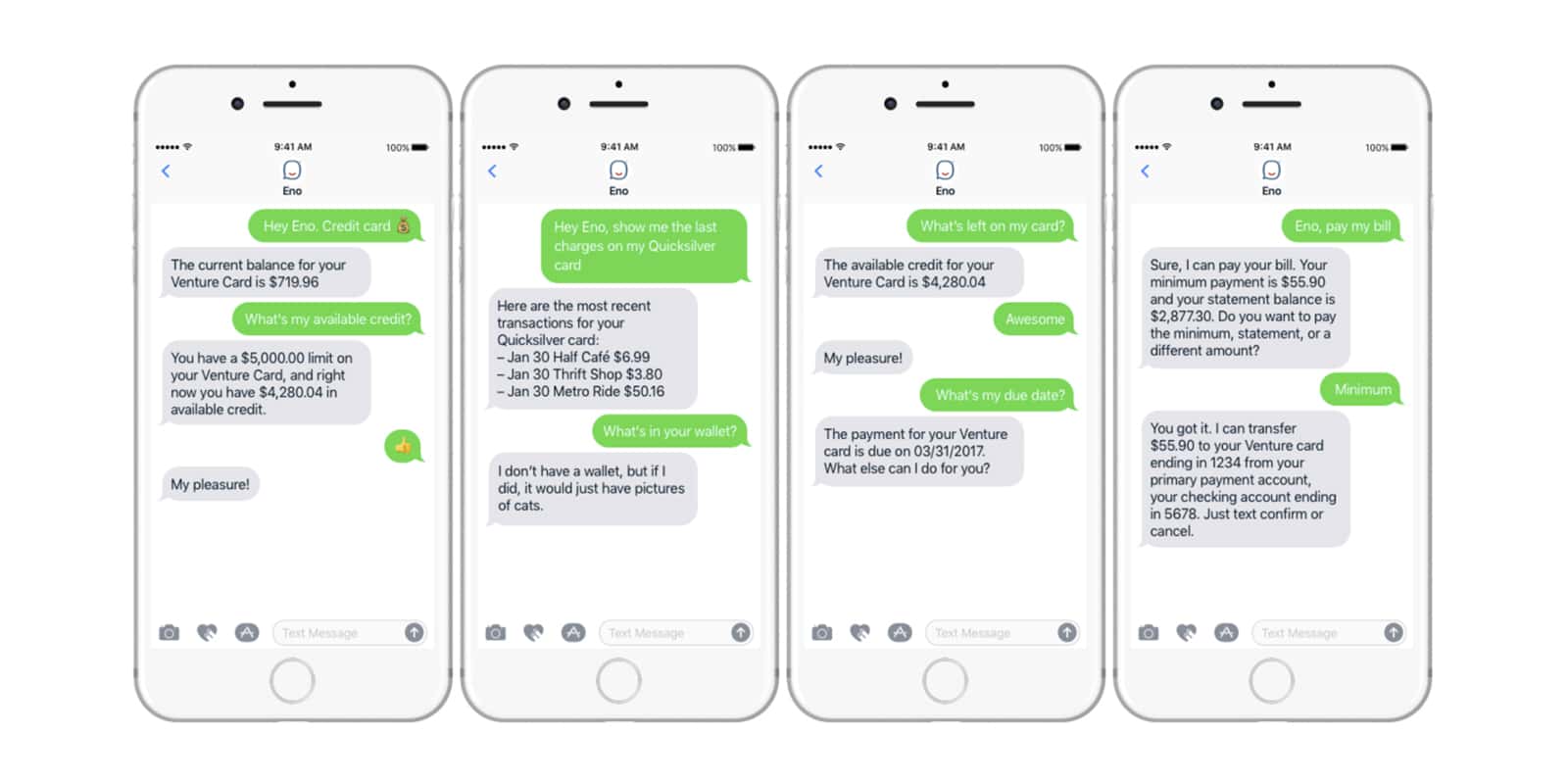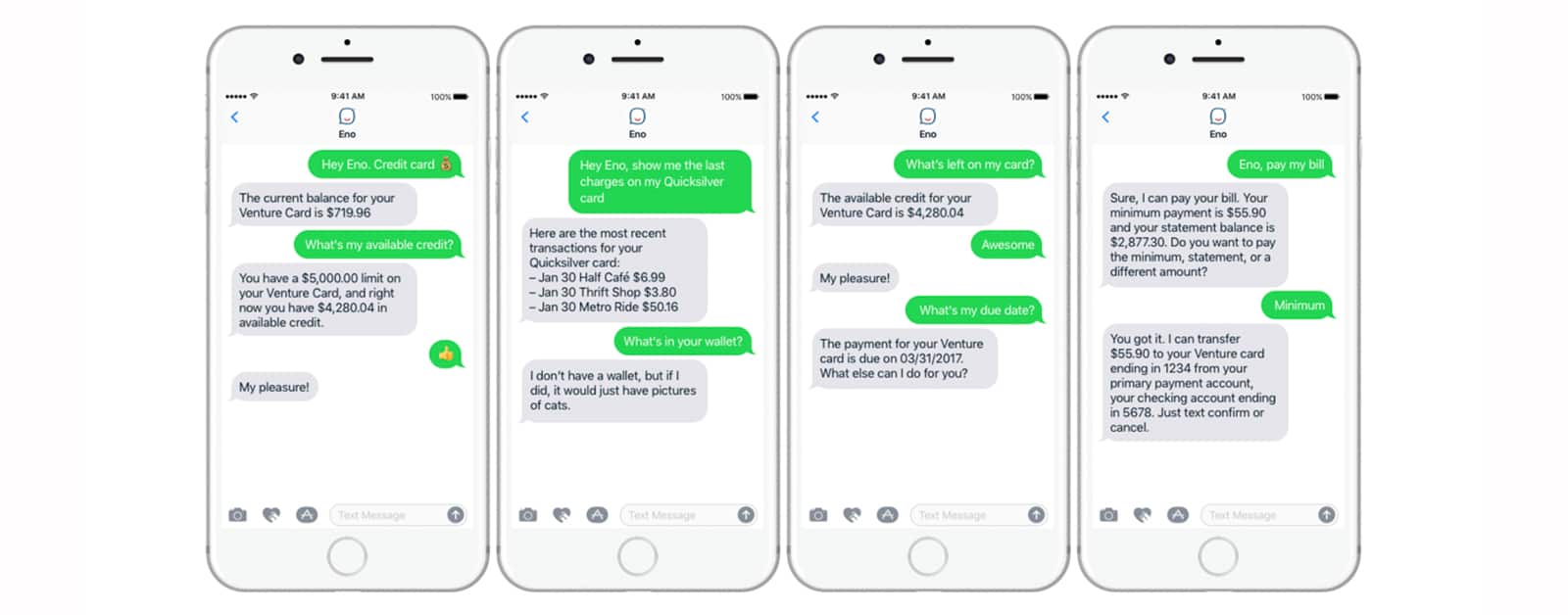Capital One announced Friday an SMS chatbot for customers called Eno. The company claimed Eno is the first natural language SMS chatbot from a U.S. bank, allowing customers to ask questions using natural language. The ability to interact with artificial intelligences using natural language processing is something big companies like Apple, Amazon and Google are working on with their own virtual assistants.
Customers can ask Eno questions about their checking and savings accounts using a text interface. Examples might include “What’s my balance?” or “How much credit do I have?”
What Is Eno?
Eno—”one” spell backwards—is a natural language chatbot that people interact with through texting. The bank found that when it sent out automated fraud alerts through SMS, customers thought that the sender was human and started interacting with it. Ken Dodelin, Capital One’s vice president of digital product development, said “We kind of launched a chatbot and didn’t know it.” (via FastCompany).
This is remarkably different than other brands that launch chatbots through platforms like Facebook Messenger and Skype. Capital One believed Facebook has too much access to peoples’ private information, which could run into trouble with privacy laws U.S. financial institutions work under. When a brand has a Facebook Messenger bot, any Facebook Page admin can access full transcripts of the bot’s conversations. Admins could potentially view the personal banking information of customers.

Why NLP Is Important, But Difficult
Natural language processing is sort of the holy grail when it comes to artificial intelligence. Virtual assistants like Alexa and Google Home operate with command words. This lets companies bring assistants to market quickly, but at the expense of the “intelligence” part of artificial intelligence. NLP is quite difficult to achieve and requires vast amounts of computing resources.
Devices like Amazon Echo and Google Home have a limited amount of processing power. Each device is powerful enough to activate when it hears a certain command, like “Hey Alexa,” or “OK Google.” But complex questions are sent to cloud-based servers Amazon and Google operate. Your voice recording is sent to the servers, processed, then sent back to fulfill your command.

In an interview with Steven Levy, top Apple executives assured us that AI is at the forefront of Apple’s technological growth and well established in the Apple ecosystem. According to Apple senior vice president Craig Federighi:
We hire people who are very smart in fundamental domains of mathematics, statistics, programming languages, cryptography…It turns out a lot of these kinds of core talents translate beautifully to machine learning. Though today we certainly hire many machine learning people, we also look for people with the right core aptitudes and talents.
Eno Is Gender Neutral
Something else unique about Eno is that Capital One specifically decided to make it gender neutral. TMO‘s John Martello explored this in his piece The Thinking Behind a Female Voice for Siri. Why are many artificial assistants like Cortana and Alexa given female voices and pronouns? Is it an example of the rampant sexism in Silicon Valley or a deeper issue? As an example, John mentioned “Bitching Betty,” a slang term given to certain aircraft warning systems by pilots.
When you ask Eno if it’s male or female, it will reply that it is “binary.” Ken Dodelin said this was deliberate due to recent criticism around female virtual assistants ( via Reuters).
Limited Availability
Right now, Eno is a pilot program and only available to a limited number of customers. Capital One said it will eventually involve more people in its testing. You can sign up for the Eno waiting list, which requires your name, email address and mobile carrier. If you change your mind, you can text the chatbot “Unenroll” and it will disable Eno for you.

As this sort of thing takes over, and it will, call centers will go the way of telephone switchboard operators. Dustbin of history. This is what that we mean when we talk about robots taking people’s jobs. Not androids like Data, but specific, AIs or specialized devices that do a few things very fast and perfectly every time. Once robots take over a job class those jobs aren’t coming back either. It will always be cheaper to run a few servers for Eno than to have a few dozen live people on phones to answer questions. It will always be cheaper to have a robot that does nothing but assemble iPhones, than to have a person do it. Even if those people are in India. When people talk about bringing manufacturing jobs back to the US, sorry but they’re gone. Even Foxconn is rapidly replacing people with robots for assembly.